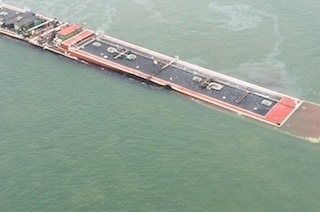The National Transportation Board found plenty of blame to go around in a new report concerning the collision between a towboat and its two barges and a bulk carrier in the Houston Ship Channel in March 2014. The NTSB said the barge tow collided with the ship after it had crossed the ship channel and impeded the passage of the bulk carrier.
The accident involved the 607' bulk carrier Summer Wind and two 300'x54'x12' tank barges carrying fuel oil towed by the 78'x28' towboat Miss Susan. The collision breached the hull of the forward tank barge in the Miss Susan tow and spilled approximately 168,000 gals. of bunker fuel into the Houston Ship Channel. The barges and towboat are owned by Kirby Inland Marine. Each barge had a 26,741-bbl. capacity in six tanks. One of those tanks was ruptured in the accident. The bulk carrier was the property of Sea Galaxy Marine, Liberia, West Africa, when the accident occurred.
NTSB investigators found fault with the towboat’s captain, the pilot from the Houston Pilots Association aboard the bulk carrier, the Summer Wind’s master, the port’s Vessel Traffic Service, and the Coast Guard.
The NTSB said that the probable cause of the collision was the Miss Susan’s captain’s attempt to cross the Houston Ship Channel ahead of the Summer Wind, which impeded the passage of the bulk carrier, which could transit only within the confines of the channel. Contributing to the accident was the failure of the Houston pilot and the Summer Wind master to set a safe speed given the restricted visibility and towing vessel traffic in the vicinity, and the failure of the Miss Susan‘s captain and the Houston pilot to establish early radio communication with each other. Also contributing to the accident was the failure of the Vessel Traffic Service Houston/Galveston to interact with the two vessels as the risk of collision increased, and the lack of the Coast Guard vessel separation policy for the Bolivar Roads Precautionary area.
As a result of the accident investigation, the NTSB made the following recommendations:
• To the Coast Guard: Include in your new towing vessel inspection regulations requirements for availability and use of personal protective equipment, hazardous materials training and identification and mitigation of health and safety hazards posed by exposure to hazardous materials.
• To Kirby Inland Marine: Provide direct-reading air monitoring equipment and applicable training to your towing vessel crews that transport hazardous materials, so that crews can identify combustible or explosive atmospheres, oxygen deficiency, and toxic substances that may present risk of serious injury.
• Also to Kirby: Revise your initial and refresher Hazardous Waste Operations and Emergency Response training to include demonstration of competence, and ensure that crewmembers complete this training before serving on vessels that transport hazardous materials.
• To the American Waterways Operators: Inform your members of the circumstances of this accident and the need for towing vessels that transport hazardous materials to carry direct-reading air monitoring equipment, so that crews can identify combustible or explosive atmospheres, oxygen deficiency, and toxic substances that may present risk of serious injury.




